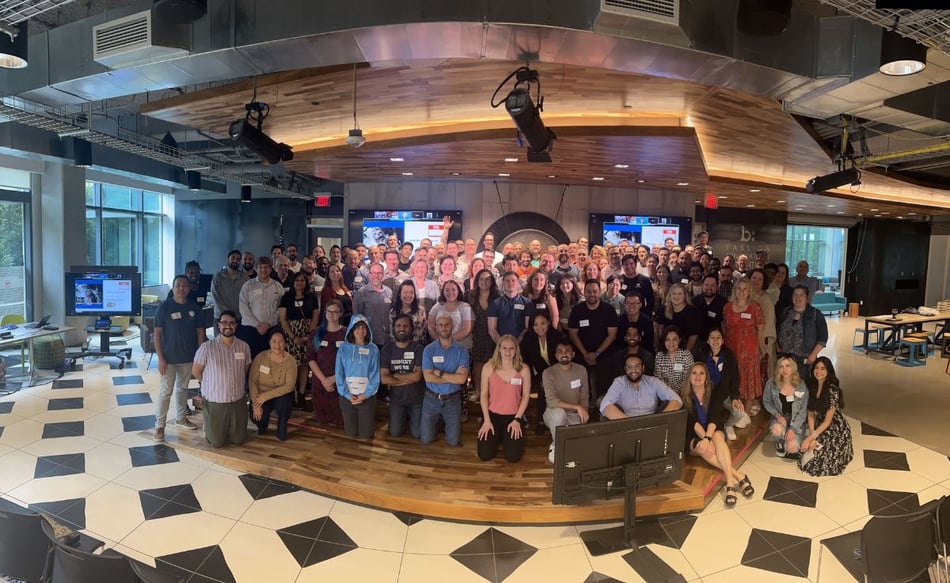In the ever-evolving landscape of business, one undeniable truth stands out: a company is more than its balance sheet, its products, or its profit margins. A company, at its core, possesses a soul — an intangible, vibrant force that drives its purpose, shapes its culture, and propels it toward meaningful change in the world.
As a serial founder and CEO, this is something I’ve always known but really solidified after meeting John Mackey, the co-founder of Whole Foods and the co-founder of the Conscious Capitalism movement. If you’re unfamiliar with conscious capitalism, it’s the philosophy that businesses can and should be forces for good and agents of lasting positive change.
This was also something that I learned a lot about through the Henry Crown Fellowship. Henry Crown was a Jewish immigrant who came to Chicago with barely a penny to his name. After becoming a self-made billionaire, he devoted his time to bringing successful business leaders together in Chicago to look at all the things that needed work and work to fix them.
It was this mindset of, “If not us, then who?”
That question — really, the quest — is the foundation of an entrepreneur’s soul, that drive to be the change, to make a difference.
It was also the Henry Crown Fellowship that led me to Jay Coen Gilbert, the founder of the B Corporation movement. I was in the process of founding my next and current venture, data.world, and it made perfect sense to me: why would I not found it as a B Corp? It was something baked into our foundation with our strong mission, and we became the first B Corp most of our investors ever backed.
After several successful exits and other meaningful entrepreneurial ventures, today I’m the co-founder and CEO of data.world, an Austin-based, Certified B Corporation startup with about 140 employees. We’re on a mission to democratize access to data, allowing it to be easily discovered, governed, and monitored. This includes public data for the benefit of society, helping to solve our biggest challenges. It’s a company with a soul, and as the CEO, I’m always thinking about how to nourish it, to cultivate a purpose-driven culture that not only achieves business success but also leaves a lasting impact on society.
.jpg?width=1200&height=737&name=data%20world%20full%20team%20(1).jpg)
data.world team
Hiring with Purpose
People form the collective soul of your company, and the best performing companies are the ones with a really strong soul.
That means you have to have the right people in the right place.
Hiring is one of the most critical steps in nurturing a purpose-driven company. It's not just about skills and qualifications; it's about finding people whose personal values resonate with the company's mission. But how do you get a good sense of this in the interview process?
Having grown up in Austin, I often think about the time I wanted to play guitar. I wanted to play the electric guitar so bad, and when I finally picked it up and started playing, I realized I didn’t like it so much.
Give candidates the opportunity to pick up the metaphorical guitar.
Let’s take a sales role for example. We ask candidates to pitch to us in a simulated Q&A session, mirroring the challenges they'd face in their role. This approach not only assesses their skills but also gauges their passion, adaptability, and self-starting nature. It also gives them a chance to realize that they might not like playing the guitar either. But when they play well, that foundation you will collectively build will be so, so strong.
Values as the Bedrock of Culture
Culture shouldn’t be just a buzzword; it's the beating heart of a purpose-driven organization. It also can’t be something you just write on the walls and hope people follow.
At data.world, we derived our core values from the collective voices of our team members. By asking everyone what values mattered most to them, we co-created a set of guiding principles that form the foundation of our culture. These values are lived and breathed, not just during onboarding, but throughout an employee's journey. We even include them in self-assessments and managers' evaluations for our biannual performance reviews.

data.world company picnic
As the CEO, one of the roles I play is the Chief Culture Officer. This isn’t something I can delegate out. If the CEO sets the tone, the entire executive team will make time for culture. And the CEO is judged by the strength of its executive team: we have to live out the values just as much as the entire team.
If you throw away your personal values, you degrade your soul. The same goes for your company.
The CEO's Role in Nourishing the Soul
In addition to being the Chief Culture Officer, I see the CEO taking on two more important responsibilities: Chief Strategy Officer and Chief Resource Officer.
The Chief Strategy Officer synthesizes the collective strategies of the organization, both internally and externally.
The Chief Resource Officer makes sure the right resources are being allocated correctly — do we have the right people on board? Do we have the right funding and do those investors have the right values (you should always be careful who you take money from)? Do we have the right tech stack? And so on.
This is how I think about the job of a CEO, and how I measure success. It’s always a moving target, and you can have good weeks and bad weeks, but this is the best way to know where you need to spend your time.
The concept of success is multifaceted for a purpose-driven CEO. It's not solely about financial gains or market dominance, but also about fostering a positive impact on society, clients, employees, and stakeholders. The moments of triumph come when our customers, partners, and prospective team members choose us because of our values and our team. And we know this because they tell us our values are important to them.
Nourishing the soul of a company is a dynamic, ongoing journey that requires adaptability, persistence, and the willingness to evolve. Success isn't measured solely by profit margins or stock prices, but by the meaningful changes we bring to the world, the culture we foster, and the impact we leave on the lives of our employees, customers, and communities.
About The Author
 Brett Hurt is a serial founder and entrepreneur. An Austin native, he became interested in computer programming at age seven, thanks to his mother, and taught himself to code. His first business was a consulting firm focused on building early Web applications, quickly followed by his next - a global eCommerce site that sold sports nutrition products. After that, he founded Bazaarvoice, which became the world’s largest social commerce SaaS company and that he led through a $1 billion IPO. He currently serves as the co-founder and CEO of data.world, a B Corp and Purpose Certified company. Brett is also a Co-owner of Hurt Family Investments, which is involved in 133 startups, 41 VC funds, and counting. Passionate about purpose-driven leadership, Brett is the author of a book on the topic, The Entrepreneur’s Essentials. The book is available for free online, or it can be purchased on Amazon and proceeds go to support female entrepreneurs.
Brett Hurt is a serial founder and entrepreneur. An Austin native, he became interested in computer programming at age seven, thanks to his mother, and taught himself to code. His first business was a consulting firm focused on building early Web applications, quickly followed by his next - a global eCommerce site that sold sports nutrition products. After that, he founded Bazaarvoice, which became the world’s largest social commerce SaaS company and that he led through a $1 billion IPO. He currently serves as the co-founder and CEO of data.world, a B Corp and Purpose Certified company. Brett is also a Co-owner of Hurt Family Investments, which is involved in 133 startups, 41 VC funds, and counting. Passionate about purpose-driven leadership, Brett is the author of a book on the topic, The Entrepreneur’s Essentials. The book is available for free online, or it can be purchased on Amazon and proceeds go to support female entrepreneurs.






